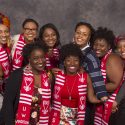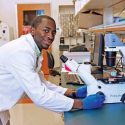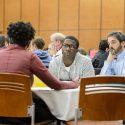UW-Madison prepares cultural competency program for new students
Students, staff and faculty are working this summer to develop a program called “Our Wisconsin” aimed at increasing knowledge about cultural differences and promoting community among incoming students.
The new training was announced by Chancellor Rebecca Blank in March as part of a series of initiatives to improve the campus climate. A pilot version will debut this fall with the goal of making it mandatory for new students by fall 2017. Organizers hope to have as many as 1,000 students participate in the pilot.
“College is often the first time where people are exposed to people who are different from themselves — those could be religious differences, racial, socio-economic status, or sexual orientation,” says Joshua Moon Johnson, who is leading the program’s development as interim special assistant to the Vice Provost for Student Life. Most of the problems seen on college campuses stem from ignorance, not malice, he says.
Johnson, who chairs the UW–Madison Hate and Bias Incident Team says many of the incidents reported to the team involve disrespectful speech that was intended to be funny or inquisitive. Those result from people lacking an understanding of the historical context surrounding race, difference and violence, he says.
The training will be conducted in person in two sessions. It will provide an opportunity to discuss topics such as identity, culture and microaggressions.
“This pilot is an effort to definitely create some broad awareness of difference — not to tell people how to think, but to tell people how to critique the ways in which they think,” Johnson says.
The university is working with Infinity Martinez Consulting to develop the curriculum, in collaboration with experts on campus, and to gauge its effectiveness.
“We didn’t want to reinvent the wheel,” explains Steve Quintana, a professor of counseling psychology. “Martinez is a leader in the field and has done many similar programs at other universities.”
Katrina Morrison, a junior from Milwaukee, is one of the students who are helping to shape the program. She campaigned as a representative for the Associated Students of Madison pledging to address campus climate and continues to fight for progress on the Equity and Inclusion Committee.
“We wanted to talk about privilege. What is white privilege? What are sets of privileges that we all have?” says Morrison. “It’s okay that we all have these different sets of privileges and identities and we can still coexist.”
Next steps for the program include hiring a director to oversee implementation and hiring peer facilitators as well as faculty and staff facilitators.
In addition to raising awareness, a paramount goal of the program is promoting communication skills so students feel comfortable starting dialogues about topics like racism, sexism and religious differences.
“We want our students to take active roles in positively influencing campus,” says Johnson. “Students have the power to set community standards — standards that value and welcome people from all backgrounds.”



